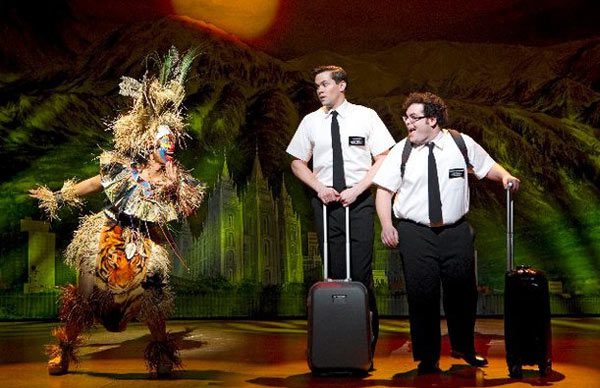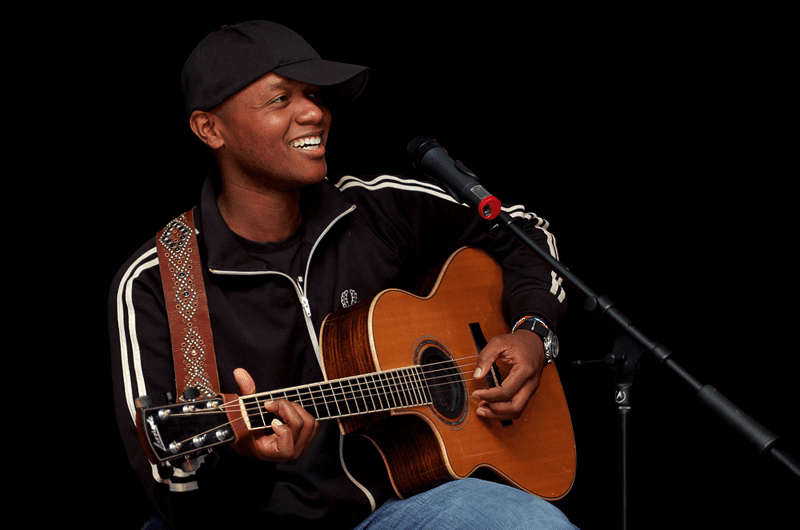
By Karen Keller
Insider humor might be one of the funniest genres of comedy.
My Mormon brother jokes about the old Mormon male ‘garments’ – gauzy white underclothes Mormon adults wear – saying they were ‘onesies’ that gave you a wedgie if you shrugged.
But admittedly, as I watched “Book of Mormon,” the new Broadway musical from the non-Mormon creators of South Park which officially opened on March 26, I cackled at some Mormon-ribbing jokes.
In one of my favorite scenes a group of naïve but well-meaning missionaries in Uganda belts out, “We are the tears of Nelson Mandela, the sweat of the ‘lost boys of Sudan, We are a monkey and a banana, a tribal woman without a bra,” after some locals appear interested in learning about the church.
Overall, “Mormon” storyline spins a heartwarming tale that makes you empathize with the two Mormon missionaries – one cocky, the other nerdy – who get sent to Africa, full of optimism, only to confront the brutal reality of local life in one Ugandan village, which features female circumcision and a bloodthirsty local regime.
I was also pleased that the show also credits Mormons with an ability to turn locals’ lives around for the better. And the show definitely could have been more offensive: It could have depicted Joseph Smith penning the Book of Mormon as he burned midnight oil.
But other aspects I found troubling.
Some of the facts were wrong.
Unlike the show would have you believe, it doesn’t say anywhere in sacred Mormon text that Mormons believe they’ll get their own planet after they die. I’ve heard this misconception over the years and could never figure out where it came from. I never heard it mentioned in my more than a decade of memories inside Mormon churches, and I confirmed it’s not a Mormon belief thorough a church spokeswoman.
Another wrong detail: Missionaries aren’t stuck with just one partner for two years. They trade off typically at least every six months, said Kim Farah, the LDS spokeswoman.
Then in the “scary Mormon hell” dream sequence, in which one of the missionary protagonists dreams he’s in hell, felt like they were mixing up Mormons with a Christian fundamentalist group. Mormons don’t obsess over hell. In fact hell is rarely mentioned in church teachings, as far as I remember.
Then there was the overall snub.
It was disturbing to me that I couldn’t imagine the show creators choosing to satirize instead “The Torah,” “The New Testament,” “The Koran” or “Vinaya Pitaka,” with zero input from members of those religions in the show’s creation.
Why is liberal society seeming to give a free pass for ridiculing Mormons?
I should probably disclose here that I’m a direct descendant of one of Joseph Smith’s best friends, Reynolds Cahoon, who’s a decidedly minor figure in Mormon history. My extended family is a patchwork of devout Mormons and Starbucks-swilling atheists. My Jewish fiancé and I joke that our kids will be cute creatures known as “Mormews.”
I don’t personally believe in the divinity of any religious text, but that doesn’t get in the way of me wanting to respect others who do.
Respect isn’t something Parker and Stone can say they’ve showed to Mormons – despite the tomes of reviews to the contrary.
The funnyman pair has asserted in a flurry of interviews that the show is actually a love letter to Mormons. But there’s something decidedly passive-aggressive about Stone and Parker saying Mormons are wholesome and cuddly, then depicting Mormon belief as a sham.
Saying a group is nice doesn’t pass as respecting them.
Blasphemous lines in the show include a missionary talking about “ancient upstate New York” taking place the 19th century. The missionary mixes up the facts – Mormons believe Joseph Smith recovered a long-buried ancient text in upstate New York in 1827. It’s a character making the comments, not an omniscient narrator, but the joke is clearly meant to ridicule Mormons as gullible.
In another scene, one of the missionaries says he feels ridiculous for believing the Jews-sailing-to-America plot of the Book of Mormon, when it isn’t backed up by archealogical proof in Central America, he says.
So the show’s creators get the facts wrong. Then they stab the heart of Mormonism by calling out the church as afake.
Then they even claim to have Mormon cred, of sorts.
Parker and Stone frequently cite having Mormons friends growing up, implying that this somehow gives them a right to speak for them. (It’s not true that either grew up Mormon, as rumor has it – even my Mormon bishop father believed this, sadly)
In Colorado as kids, the pair gush, they always admired Mormons’ stereotypical wholesome, upbeat attitude. Parker talks about having a Mormon girlfriend once.
I grew up around a ton of Asians and Mexicans in the Bay Area, but I don’t feel at all Asian or Mexican. I had a Muslim boyfriend once, but I don’t feel like I have a special voice to represent Muslims.
Sure, “Mormon” isn’t the first controversial religious-themed musical. But in the case of probably the most famous example, Jesus Christ Superstar, the 1971 Broadway rock-opera hit that fixates on Jesus’s relationship with Judas, the show offended both Christians and Jews.
“Mormon” is about a minority group, and that feels more offensive. Jesus Christ Superstar riffs off of the Bible – a book at least 175 million Americans hold sacred including Mormons. The Book of Mormon, by contrast, is considered a holy book by roughly 3.2 million people in the U.S. in 2008, according to the U.S. Census.
“Big Love” doesn’t really enter the conversation, by the way.
Different from what you may think, the HBO series isn’t about Mormons. The Mormon church doesn’t recognize the sect depicted in the show. The Church outlawed polygamy in 1890. The average Mormon thinks polygamy today is just as strange as most people do. Plus “Big Love” creators deserve applause: They took three years to research the group to get the facts right and to ensure the show wouldn’t come off as prejudiced.
Speaking of getting facts straight, in a stunning riff of jokes in a Daily Show interview, Stewart, Trey Parker and Matt Stone (the two South Park creators, and two of the three “Mormon” writers) share a laugh about how the third “Mormon” writer, Robert Lopez, doesn’t have a ‘Mormon-sounding name.’
More Mormons speak Spanish than English, in fact, said Farah, the LDS spokeswoman.
Of the church’s 14 million members worldwide, 5.5 million live in Latin America and that doesn’t count the more than 700 Spanish-language Mormon congregations in the U.S.
There’s something weirdly clubby about the Daily Show discussion, where the members are holding forth on minority they really don’t know much about. Ironically, it is this sort of insularity Mormons get accused of.
And then Stewart asked depressingly lowball questions. No thoughtful question such as how would the show have gone over if it were about the Jews or the Buddhists or the Methodists. There could be a good answer to this question, but Stewart didn’t ask it.
It’s a form of bullying.
And no, “Mormon” isn’t just another offensive South Park episode.
People seem to be excusing the inherent prejudice to the show by saying South Park is an equal opportunityoffender. But “Mormon” has a more mainstream stamp of approval by appearing on Broadway, one of America’s oldest and grandest cultural institutions.
Modern mainstream has been turning up the heat on people who bully, with sensitivity to gay issues in particular skyrocketing recently with the suicide of the bullied New Jersey gay teen, Tyler Clementi. Kobe Bryant’s $100,000 fine for using the word ‘faggot’ in April.
Although I wouldn’t classify Mormons as suffering the same harassment as gays, they’re also a mocked minority, and there are signs society doesn’t accept slurs against Mormons, either.
Last year, San Diego State issued a formal apology after fans at a basketball game chanted, “You’re still Mormon” late in a game with BYU, the Mormon university, when BYU was winning.
Why should a Broadway musical be any different?
Far from providing any clues to new ways modern society can deal with hurtful stereotyping, “Mormon” is arguably a throwback to the days of “Uncle Tom’s Cabin.”
The show fits into an American tradition of works of fiction that portray minorities in an empathic way, well-intentioned, even, but are intrinsically prejudiced. Harriet Beecher Stowe didn’t set out to offend blacks in “Uncle Tom’s Cabin.” But the novel etched into history some humiliating and persistent stereotypes including the ‘Uncle Tom,’ a black male who is subservient to whites.
I don’t mean to say discrimination against Mormons is at all similar the horror of slavery and the more than acentury of discrimination blacks endured. But both “Mormon” and “Uncle Tom’s Cabin” are ultimately patronizing, and should be faulted for it.
Then there are the glowing reviews of “Mormon,” which make little attempt to interview Mormons. Most reviews just tack on the obligatory one-liner about the show being sure to offend some Mormons.
The show’s PR woman tartly denied my request to interview Clark Johnsen, the lone Mormon cast member of “Mormon” (who has a non-speaking part), even though I haven’t read his thoughts anywhere. She also denied me the opportunity to speak to Parker or Stone.
After the show ended, I approached a group of four 20-something men of different races, and asked them what theythought about Mormonism and if the show changed that opinion. I didn’t reveal my background. They said they didn’t believe the show was prejudiced, and in fact made them feel more positive about Mormonism because they sympathized with the characters.
My brother, who lives in California and listened to me describe the show, summed it up this way:
“No one likes to be mocked. Everyone has tender feelings for something in life (or perhaps everyone should). It doesn’t really matter what it is. Now imagine the essence ofthat thing being openly mocked, and the masses, the majority of other people, your peers and co-workers finding it funny,” he wrote in an e-mail. “The counter-point that the storyline is warm and funny isn’t much of a solace.”
Karen Keller is a writer living in New York city.


